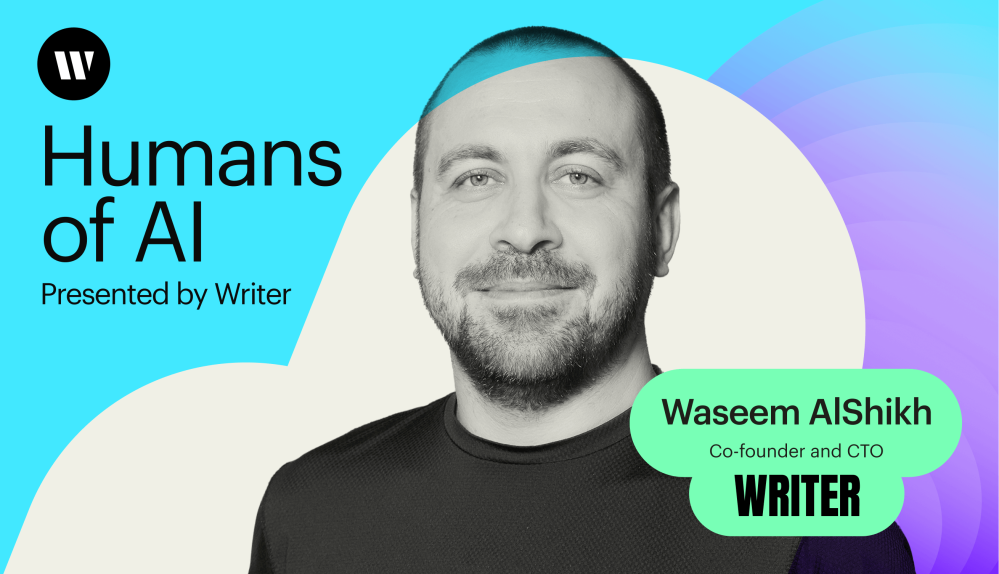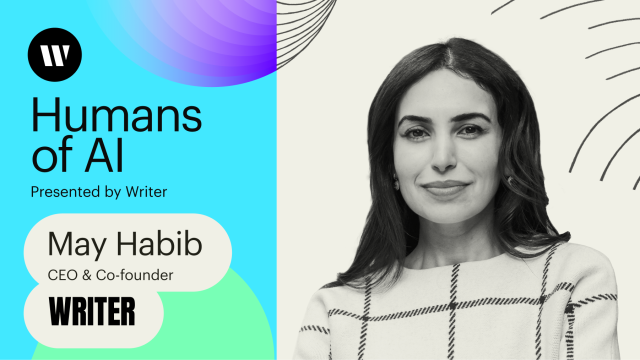Humans in the loop
– 9 min read
Defying AI industry norms and putting people first with WRITER CTO and co-founder Waseem AlShikh

When you put people first, technology doesn’t just advance — it revolutionizes. This people-centric philosophy has enabled Waseem AlShikh, our latest guest on Humans of AI, to establish a transformative generative AI company. WRITER not only competes with larger models but also prioritizes practical, impactful innovations tailored to real-world enterprise needs.
Waseem recounts his inspiring journey from Syria to becoming the CTO and co-founder of WRITER. He speaks to his early struggles with studying in a new language and how his deep passion for computer science empowered him to overcome these challenges.
Discover how Waseem’s philosophy of resilience, innovation, and strong team culture is shaping the future of technology, and integral to the success and growth of WRITER.
- During his studies in Lebanon, Waseem developed an advanced statistical model to overcome language barriers.
- After Waseem and May Habib started thinking about solving more problems in enterprise companies through machine learning and AI, they transformed their first company into WRITER.
- He challenges industry standards by outperforming larger AI models with a smaller, more efficient model and believes massive resources aren’t necessary for success.
- Waseem envisions the evolution of AI towards systems that can self-organize, self-assemble, and reason effectively.
From syntax struggles to software success
Waseem’s journey into computer science began in the mountains south of Damascus, Syria. At 18 years old, he discovered a passion for computer science — a field that wasn’t widely taught in Syria at the time. So, Waseem moved to Lebanon to pursue his studies. But instructors taught courses in English, a language Waseem wasn’t yet fluent in.
“I can’t waste two years studying just language,” Waseem says. “Not my thing. I can’t do it. I want to move fast. I want to get it done. So I study [sic] for six months, and for the rest of the six months, I just said ‘I’m going to college.’”
Waseem says he still couldn’t read quickly or keep up with everything. To solve this problem, he developed a summarization tool. Waseem says he could tell whether the model was good based on his test scores.
His first attempt was with a rule-based model.
“I know it’s failed because I used that tool to summarize a few courses and when I end up study [sic] all the summarization, I went to the exam,” Waseem explains. “Well, it was not great.”
So, he spent three months developing more advanced statistical models for summarization. The result?
“I started getting a lot of A’s,” Waseem says. “I finished the whole four years working at a restaurant, saving money, improving the software, and studying the summary. So from a 2000-page book, I only study [sic] a hundred pages.”
Even though Waseem admits those around him weren’t very supportive, it didn’t bother him. He was trying to solve a challenge, and he did so successfully — Waseem graduated and published the tool on GitHub as an open-source project.
Turning a coding career into co-founding WRITER
After graduating in Lebanon amid political instability and war, Waseem moved to Jordan for his master’s degree and later relocated to Dubai for work. In Dubai, he joined a small Twitter community of computer scientists that had about a hundred members. Waseem — often tweeting about project algorithms and Java — caught the attention of May Habib through one of his tweets.
Six months later, they met in person and forged a lasting friendship. May — with her strong entrepreneurial background — focused on broader issues, while Waseem concentrated on language and language processing challenges.
They found a way to work together, first with Qordoba, where they focused on making language consistent across an organization. As they started thinking about solving more problems in enterprise companies through machine learning and AI, the company evolved into WRITER.
Evolving WRITER amid an AI revolution
Despite technological advancements, Waseem says the core mission remains the same: to improve the model’s ability to process language, scale these solutions, and integrate them into broader contexts.
“What we have today is just the evolution of the technology itself,” Waseem says. “So if we think about it, it’s doing task like converting language to sound better, or to generate a new type of word, or questioning, or summarization, or doing mathematical application. It’s still language processing. We [sic] still going around the same idea of how we can build this machine to understand human language and scale it and build around it. Because language, the way I think about it, is just knowledge.”
Solving real enterprise problems
Waseem prides WRITER on being solution-oriented, focusing on creating solutions that meet the specific needs of their enterprise customers rather than simply offering tools. Everyone in the company listens to the customer — engineers, sales, support, and even Waseem and May personally.
“It’s a question we always ask ourselves when we build a new feature when training new models: what’s the use case? Why are we doing it? How our customers can use it from day one? This is how we’ve been actually focused on building,” Waseem explains.
Overcoming the psychological hurdles of startup culture
When you’re creating a whole new category of transformative technology, there are the usual challenges of raising money and finding the right team. But Waseem discovered the biggest challenge was psychological. He had to deal with the industry’s belief that building a successful company with large language models required huge resources, like millions of graphics processing units (GPUs).
This made it tough to motivate a small team with limited resources to take on such a challenge, but Waseem and May remained committed to believing in their team and doing whatever to make it work.
“I don’t think I need a hundred billion [dollars] and 5,000 people to build a model. I think that’s more or less wasteful and reckless,” Waseem says. “Strong opinion, I know. But we have resources and we have smart people. We can get it done.”
Waseem says WRITER has three important values that impacted the team’s culture and helped the company scale — Connect, Challenge, and Own.
“Product is only 20% of the whole company. Having the people, having the team, and making sure they have the same values — because there’s a lot of hard work — isn’t something you can disconnect with.”
How WRITER challenges industry norms
WRITER’s suite of development tools is supported by Palmyra — WRITER’s state-of-the-art family of LLMs — alongside its industry-leading graph-based RAG and customizable AI guardrails. Our latest model features 120 billion parameters and is recognized for its exceptional performance in function calling and parallel function calling.
Despite its smaller size compared to some industry models, Palmyra is outperforming larger models on the market in independent tests like the HELM benchmark. Waseem is against the current industry belief that significant progress in AI requires massive financial investments in models with hundreds of billions of parameters and extensive hardware. He thinks that smaller companies spending a lot on hardware is a problem and not a good long-term strategy.
“I’m not a stubborn person,” Waseem says. “I’m stubborn on solving the issues, but if I have data, if I have feedback, if I see a different result, I’ll definitely change my opinion.”
The beauty of the WRITER platform lies in its accessibility to all builders. We provide user-friendly APIs and SDKs for enterprise developers. But not everyone knows how to code — you can also use our out-of-the-box apps, our no-code app builder, or have WRITER design and build bespoke apps tailored just for you.
At WRITER, there’s no waiting around for the autonomous AI platform of the future. We’re the ones building it. Our Series C just closed, raising $200 million at a $1.9 billion valuation, to help us do exactly that.
A self-organizing, self-assembling AI future
Waseem sees the progression of AI development in stages. First, starting from systems that are more system-to-human, moving to systems where humans are in the loop, and eventually, to systems that can operate without direct human supervision.
Essentially, a system that can reason.
“The way we define [reasoning] here at WRITER is can we actually build a system, and can that system do two specific tasks — self-organize and self-assembly — and can do it always in the correct way at scale,” Waseem explains.
In this vision, AI systems evolve to operate independently, with other AI systems doing the supervising. The goal is for these systems to reason effectively, self-organize, and self-assemble tasks correctly and efficiently. Waseem says when we have this, we’re achieving AGI.
Shifting roles in the new era of AI
As AI gains autonomy, our roles will shift to overseeing and guiding these systems. That’s why our platform features a control plane with comprehensive guardrails to centrally manage all your AI applications.
Already, Waseem is witnessing AI’s growth in the hands of WRITER customers. He speaks to a healthcare customer who sped up the time required for claim approvals from four to six weeks to just a few days.
“Seeing this kind of use case is just fascinating to me,” Waseem says. “We’re really changing people’s lives. Maybe we’re not seeing it in the inside when we build the models or we create the tools. But we have amazing customers coming and taking this technology and willing to put it in the front and adopt very complex use cases on it and put it in production.”
As always, people-first
It always comes back to the people — our team and our customers. We’re building a tech company, but there’s a reason we named this podcast Humans of AI: WRITER understands how humans are at the center of it. And at the center of this work is the culture.
If Waseem’s words resonate with you, know that at WRITER, we’re expanding our team at a rapid pace. We’re on the lookout for people with the same drive and passion to be part of something big. Head over to our careers page and explore the opportunities to join us.
Want to hear more stories from the humans working at the crossroads of business and generative AI? Subscribe to Humans of AI wherever you listen to podcasts.




